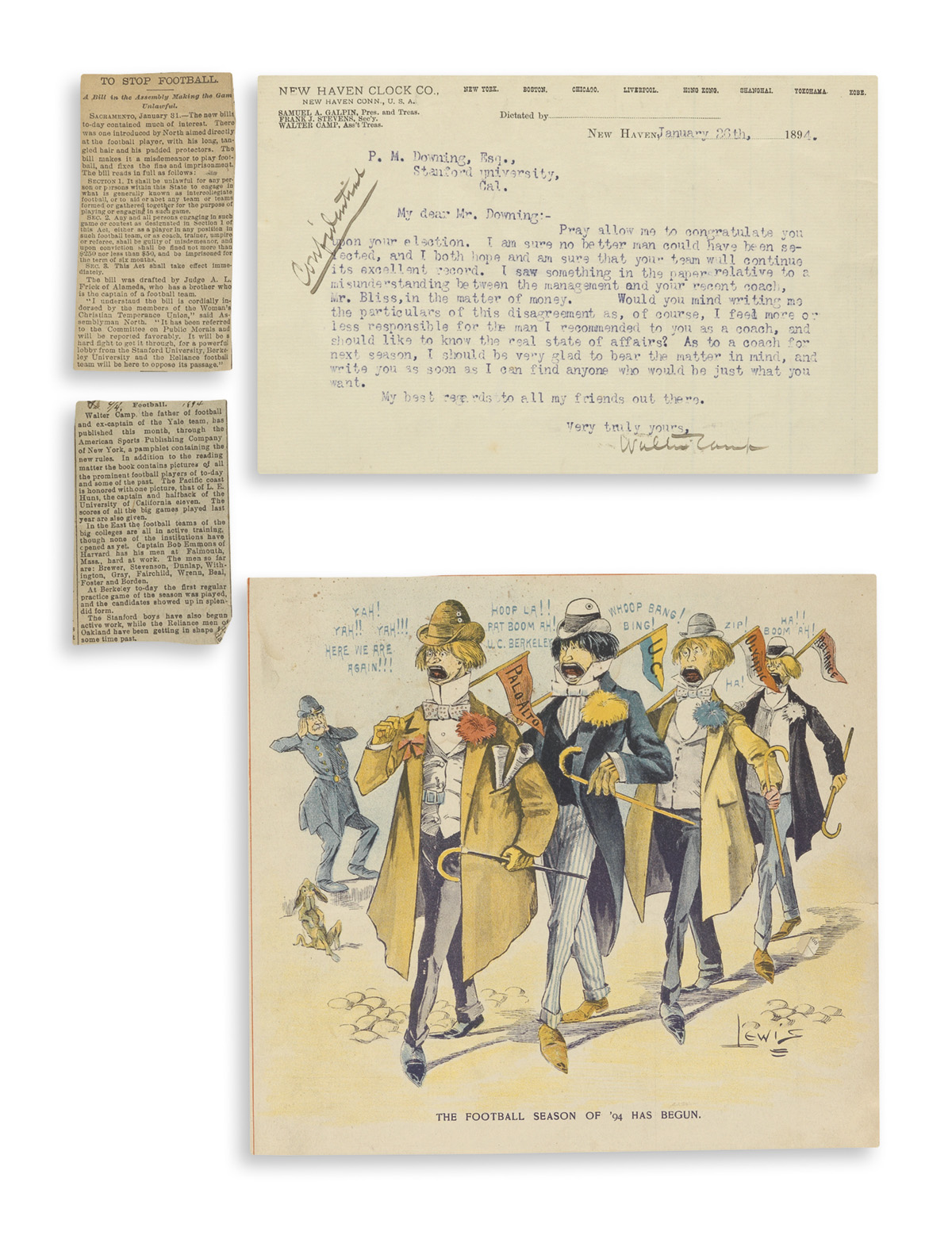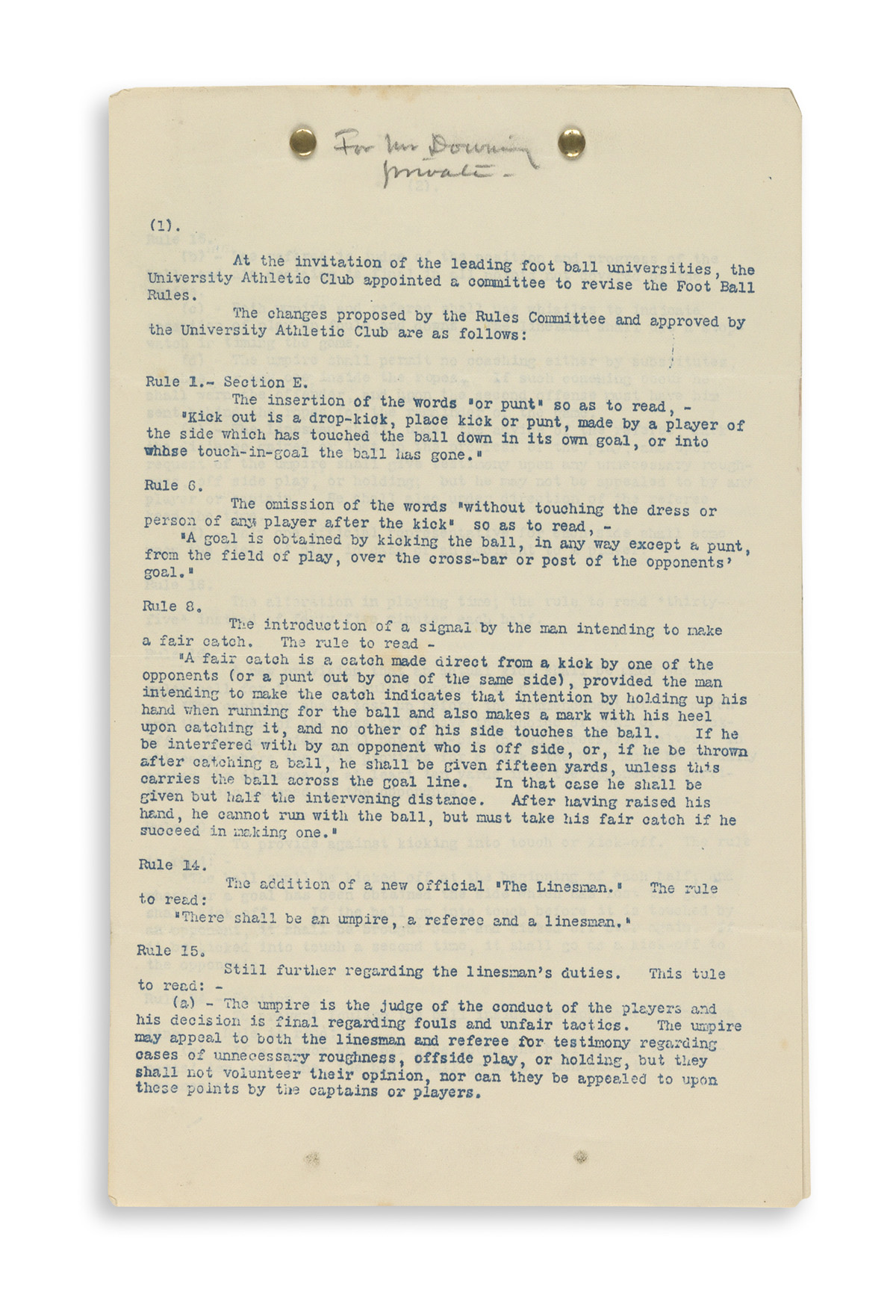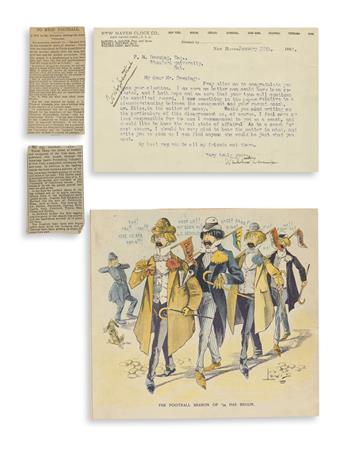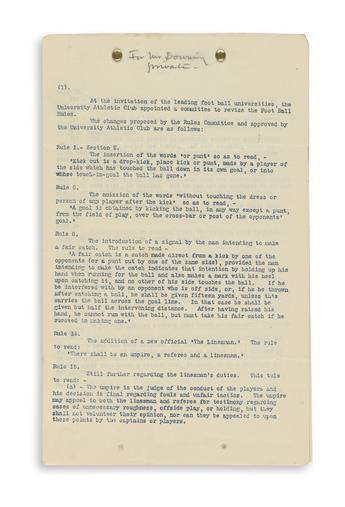Sale 2517 - Lot 209
Price Realized: $ 7,500
Price Realized: $ 9,375
?Final Price Realized includes Buyer’s Premium added to Hammer Price
Estimate: $ 8,000 - $ 12,000
"YOU MUST GET YOUR GUARDS AND TACKLES LIVELY AND MAKE THEM SMASH IN HARD" (SPORTS--FOOTBALL.) Scrapbook on early Stanford football, including letters from Walter Camp. 153 scrapbook pages including 29 letters and telegrams, 3 photographs, and 9 pieces of printed ephemera in addition to numerous clippings. Folio, original patterned buckram, minimal wear; generally well-preserved. Vp, 1893-95 and 1931
Additional Details
Paul Milton Downing (1873-1944) was captain of the football team at Stanford University who went on to coach briefly at Oregon State Agricultural College before embarking on a career as a power company executive. This scrapbook on his Stanford career--a treasure chest of early collegiate football history--includes 6 messages from the legendary Walter Camp (1859-1925) of New Haven, CT, often called the Father of American Football.
Camp was at that time a former Yale player and coach and served two brief stints as Stanford coach in 1892 and 1894-95. The earliest message is a Typed Letter Signed from 26 January 1894, congratulating Downing for his election as captain, inquiring about the disagreement with former coach Pop Bliss, and offering to help with a search for a new coach. A 8 March 1894 Typed Letter Signed recommends John Hartwell to serve as Stanford's coach: "Four weeks under a man such as Hartwell would be a great deal better than the entire season under an inferior man." On 1 September, Camp wrote in a Typed Letter Signed: "Practice your small wedges, and your running game, just the same as I taught you when I was there. But above all be sure that you have some good kickers, so that it will not be necessary . . . to teach men how to kick toward the end of the season." On 14 December 1894, Camp's 3-page Autograph Letter Signed offers detailed advice on Stanford's coming Christmas game against Alonzo Stagg's University of Chicago team: "Your team was trained to beat Reliance and Berkeley and they carried out their contract. The Univ. of Chicago is quicker, and you will need a fast end even if you shd have to put Frankenheimer up and use Dole as a half. . . . Insist upon your tackles and guards getting thro hard and fast into interference. Kick when ball is in your territory but never use the quarter back kick. . . . Do your punting from 'tackles back'--it's a good formation for preventing the opponents from reaching the kicker. Never make a long pass or a risky play in your own goal." 5 days later Camp followed up with a 4-page Autograph Letter Signed: "I was sorry to learn . . . that your freshmen were defeated by Berkeley. I felt a little guilty because I didn't insist upon their playing more against our varsity, but I had my hands pretty full to make sure of the Thanksgiving match." He also offers more advice on the coming Chicago game: "They will use close interference and strike the line hard. You must get your guards and tackles lively and make them smash in hard, and make them play low in the line." Camp's thoughts remained with Stanford when he send a game-day telegram on 25 December: "Only chance, break their line. Good luck." Coach Camp's wife Alice Sumner Camp also sent an undated note: "Do not open this Merry X-mas until the 25th when I hope you will beat Stagg's team." The program for Chicago's return visit to Stanford dated 29 December 1894 is included. Also among the printed ephemera is a 5-page mimeograph typescript which begins: "At the invitation of the leading foot ball universities. . . . The changes proposed by the Rules Committee and approved by the University Athletic Club." It is marked in pencil "For Mr. Downing, private"--apparently in Walter Camp's hand.
Other correspondents include two College Football Hall of Famers: Yale captain and Frank A. Hinkey, recommending possible coaches on illustrated Yale University Foot Ball Association letterhead, 8 March 1894; and Princeton grad Philip King declining a position as coach, 24 January 1894. Other random bits include a second-generation photograph of the University of California team on page 38; and a baseball scorecard for the "Fats vs. Leans of the Tacoma Athletic Club" for 7 September [1895?]. Pages 1-93 are almost entirely devoted to Stanford football, including clippings on Camp and the annual "Big Game" against Berkeley. Pages 94-153 relate almost entirely to a 1931 reunion of the Stanford football team at the home of their student manager Herbert Hoover--his home being the White House. Included are numerous newspaper clippings on the event from around the country, two press photographs of Downing and his besuited old teammates in football poses, several planning telegrams, and the original engraved White House invitation issued to Downing. Provenance: consigned by a descendant of Paul Downing.
Camp was at that time a former Yale player and coach and served two brief stints as Stanford coach in 1892 and 1894-95. The earliest message is a Typed Letter Signed from 26 January 1894, congratulating Downing for his election as captain, inquiring about the disagreement with former coach Pop Bliss, and offering to help with a search for a new coach. A 8 March 1894 Typed Letter Signed recommends John Hartwell to serve as Stanford's coach: "Four weeks under a man such as Hartwell would be a great deal better than the entire season under an inferior man." On 1 September, Camp wrote in a Typed Letter Signed: "Practice your small wedges, and your running game, just the same as I taught you when I was there. But above all be sure that you have some good kickers, so that it will not be necessary . . . to teach men how to kick toward the end of the season." On 14 December 1894, Camp's 3-page Autograph Letter Signed offers detailed advice on Stanford's coming Christmas game against Alonzo Stagg's University of Chicago team: "Your team was trained to beat Reliance and Berkeley and they carried out their contract. The Univ. of Chicago is quicker, and you will need a fast end even if you shd have to put Frankenheimer up and use Dole as a half. . . . Insist upon your tackles and guards getting thro hard and fast into interference. Kick when ball is in your territory but never use the quarter back kick. . . . Do your punting from 'tackles back'--it's a good formation for preventing the opponents from reaching the kicker. Never make a long pass or a risky play in your own goal." 5 days later Camp followed up with a 4-page Autograph Letter Signed: "I was sorry to learn . . . that your freshmen were defeated by Berkeley. I felt a little guilty because I didn't insist upon their playing more against our varsity, but I had my hands pretty full to make sure of the Thanksgiving match." He also offers more advice on the coming Chicago game: "They will use close interference and strike the line hard. You must get your guards and tackles lively and make them smash in hard, and make them play low in the line." Camp's thoughts remained with Stanford when he send a game-day telegram on 25 December: "Only chance, break their line. Good luck." Coach Camp's wife Alice Sumner Camp also sent an undated note: "Do not open this Merry X-mas until the 25th when I hope you will beat Stagg's team." The program for Chicago's return visit to Stanford dated 29 December 1894 is included. Also among the printed ephemera is a 5-page mimeograph typescript which begins: "At the invitation of the leading foot ball universities. . . . The changes proposed by the Rules Committee and approved by the University Athletic Club." It is marked in pencil "For Mr. Downing, private"--apparently in Walter Camp's hand.
Other correspondents include two College Football Hall of Famers: Yale captain and Frank A. Hinkey, recommending possible coaches on illustrated Yale University Foot Ball Association letterhead, 8 March 1894; and Princeton grad Philip King declining a position as coach, 24 January 1894. Other random bits include a second-generation photograph of the University of California team on page 38; and a baseball scorecard for the "Fats vs. Leans of the Tacoma Athletic Club" for 7 September [1895?]. Pages 1-93 are almost entirely devoted to Stanford football, including clippings on Camp and the annual "Big Game" against Berkeley. Pages 94-153 relate almost entirely to a 1931 reunion of the Stanford football team at the home of their student manager Herbert Hoover--his home being the White House. Included are numerous newspaper clippings on the event from around the country, two press photographs of Downing and his besuited old teammates in football poses, several planning telegrams, and the original engraved White House invitation issued to Downing. Provenance: consigned by a descendant of Paul Downing.
Exhibition Hours
Exhibition Hours
Aliquam vulputate ornare congue. Vestibulum maximus, libero in placerat faucibus, risus nisl molestie massa, ut maximus metus lectus vel lorem.






